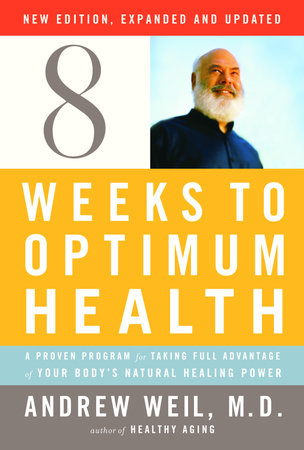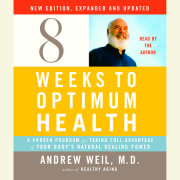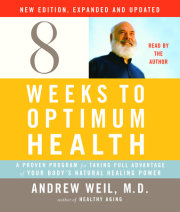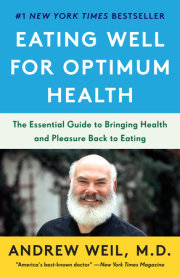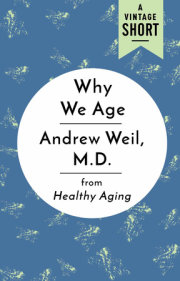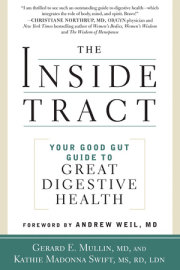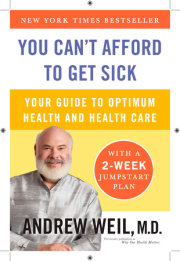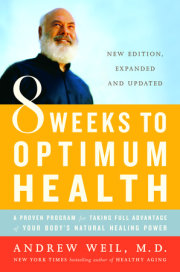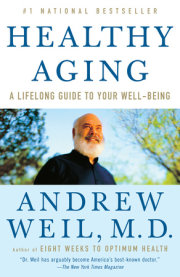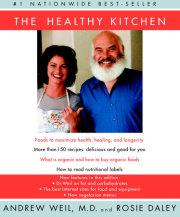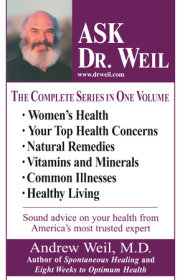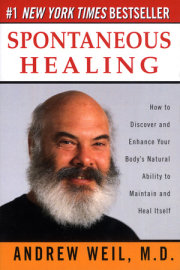Chapter 1People Can ChangeYou have in your hands a tool for changing your life, an Eight-Week Program for improving health and gaining access to the power of spontaneous healing in your body. I will guide you through this program step by step, explaining the changes I will ask you to make in how you eat, how you exercise, how you breathe, and how you use your mind. I will recommend vitamins, minerals, and herbs you can use to protect your body’s healing system, and I will give you ideas about how you can change long-standing patterns of behavior that impair optimal health.Maybe you have picked up this book because you want to have more energy. Maybe you want to lose some weight. Maybe you worry about getting older and developing diseases that disabled your parents. Perhaps you travel frequently and find it hard to maintain a healthy lifestyle on the road. Or perhaps you have a chronic illness, minor or major, and want to be less dependent on pharmaceutical drugs. Regardless of the specific nature of your need or concern, the information I have assembled in these pages will help you draw on your body’s own resources for natural healing.The Eight-Week Program consists of small steps that build on each other until, by the time you complete it, you have laid the foundation for healthy living. You can then decide how much of the program you want to maintain on a permanent basis. I assume that you want to make changes in your life—otherwise you wouldn’t be reading this book. I see my job as pointing you in the right direction. I have no doubt that you can change, because I know from my own experience that people can do so if they really want to.In moving files recently, I came across a yellowed clipping from
The New York Times of August 12, 1971, with the headline: “Meat-Eating 230-Pound Doctor Is Now 175-Pound Vegetarian.” The article was the featured story in the Food–Fashions–Family Furnishings section of that day’s paper and carried the byline of Raymond A. Sokolov, then a Times food writer. It concerns a twenty-nine-year-old physician in rural Virginia who gave up animal foods except for dairy products, with a resultant increase in energy, well-being, and overall health. There is a photograph of the doctor in his kitchen preparing fresh corn. He has a full black beard, is wearing blue jeans and a work shirt, and looks content. Next to the picture is his recipe for a rich corn soup containing milk and butter, and another recipe for a barley-and-vegetable casserole that calls for a quarter-cup of peanut oil. According to the article, the doctor’s interest in consciousness led him to experiment with yoga and meditation, and “since yoga calls for a vegetarian diet, he gave up meat ‘in order to really do it right.’ He has been vegetarian ever since, to the amazement of his friends, who remember him as a voracious meat eater and a fat person while at Harvard. . . . In one year on his new diet [he] has reduced [his weight] from 230 to 175 pounds. His recurring colds and allergies have vanished.”My beard is no longer black, and I have not been able to maintain my weight at 175 pounds. I am still mostly vegetarian (I have eaten fish for the past twenty years), though now I don’t make rich soups with milk and butter, use oil in such quantities, or ever cook with peanut oil. I think I am wiser with age and in general feel much happier now than I did when I was twenty-nine.That was a watershed year for me. I had quit a frustrating job with the National Institute of Mental Health in July 1970, dropped out of professional medicine to write my first book, and made a great many changes in my way of living besides giving up meat. For the first time ever, I lived alone in a natural setting well away from a city. I had no office to go to, no obligations to meet. I began each morning with sitting meditation for as long as I could tolerate, which was not much in those days. I took long walks in the woods, practiced yoga postures in the afternoons, wrote, and read on a variety of subjects that interested me, from Native American shamanism to mushrooms and other wild foods. By August 1971, I was nearing another transition.
The New York Times article noted, “Dr. Weil will be traveling to the Amazon jungle this fall for an extended visit to some primitive tribes on a fellowship from the Institute of Current World Affairs, a New York foundation.”I held that fellowship from 1971 to 1975 and have written elsewhere about those travels. In another book,
Spontaneous Healing, I describe seeking out a shaman in Colombia during that period and explain that my studies of ethnobotany and medicine at Harvard made me want to see the rain forest, meet native healers, and try to understand the source of healing. Mostly I wanted to learn how to help people get well and stay well without using so many of the invasive and suppressive methods of conventional medicine, and I thought the knowledge I needed was to be found in remote mountains and jungles, far from classrooms and clinics. My plan was to go to southern Mexico to learn Spanish, then to make my way down to Colombia, Ecuador, and Peru to live with Indians and learn their ways with plants and healing.I knew this journey would be demanding, and when I first settled on the idea, I was in no way prepared, either physically or mentally, to undertake such an adventure. I had grown up in a row house in Philadelphia with little opportunity to spend time in nature, let alone in wilderness. On leaving Philadelphia, I attended college and medical school in Boston, then completed a medical internship in San Francisco—more urban, indoor experience. I was not very comfortable out-of-doors, being nervous about insects and wary of the sun, since I had fair skin that never tanned, only burned; I accepted this as an inherited trait that could never disappear. Although I was able to concentrate enough to handle schoolwork easily, I was restless, very susceptible to boredom, and I craved distraction. I was largely sedentary, hating exercise, and since I also liked to eat, I was overweight. My diet was free form and thoughtless. I ate anything and everything in large quantities, including very high-fat foods. I was a frequent consumer of alcohol and Coca-Cola.Though I had no significant health problems, I knew from the way I huffed and puffed climbing stairs that I was not in good cardiovascular condition. I suffered from intense pollen allergies, mostly in the summer, and also had allergic reactions to a number of medications and some foods. Sometimes I would get hives for no apparent reason. On occasion I got bad migraines.So it was clear that I was going to have to change in order to set out by myself for unknown lands and peoples in the Andes and the Amazon basin. Many of my friends could not imagine my doing any such thing, but I was determined to do so, because I believed it was the only way for me to become a true physician, one who could work with the healing power of nature. When I think back on all the changes I made in the year before I left the United States, I do not remember their being hard, even though I had to give up lifelong habits and adopt new ways of being. My memories of that year are of much fun and discovery along with a gratifying sense of accomplishment. When I look at before and after pictures of myself, I am amazed at the difference. Not only did I lose weight and grow a beard, I became aware of my strength and flexibility, got much more comfortable with myself and nature, and even, miraculously, was able to stay out in the sun and tan for the first time in my life. My allergies and headaches disappeared. By the time I got to southern Mexico, I was feeling better than I ever had in my life, full of energy, ready to plunge into unknown waters.My late friend and mentor Norman Zinberg, a Harvard psychoanalyst, used to keep that photo of me from
The New York Times—and a more recent photo—to refute those who complained to him that people could not change, and change permanently. His profession was about helping patients give up dysfunctional patterns of thought and behavior, not an easy job. As a physician and director of a university program in integrative medicine, I find myself in the same position. Patients come to me with stories of woe, and instead of giving them magical cures, I tell them they must change their diets, their habits of exercise, their ways of handling stress, even their breathing. Fortunately, the patients who come to me are self-selected. They share my philosophy of health and healing and are highly motivated to take responsibility for their well-being. They are looking for advice about what to do, and when they get it, they will act on it. Unfortunately, most doctors deal with patients who are not so motivated and are instead looking for quick fixes, who would rather take a prescribed drug than change their behavior.But I know from my experience as a physician that many of the common complaints that people have these days respond much better to simple adjustments of lifestyle than to taking medicine. You can certainly medicate yourself regularly with painkillers if you are prone to headaches, or with antihistamines if you have allergies, anti- inflammatories if you have arthritis, or sedatives if you can’t sleep, but how much better it would be to solve those problems by modifying diet and patterns of activity and rest and by using natural remedies. The Eight-Week Program presented in this book gives you all the information you need to do that and more. Above all, it will enhance and protect your body’s own healing system, which is your best defense against illness, the stress of modern life, and the assaults of a toxic environment.I do not mean to minimize the difficulty of change. Inertia is resistance to motion, action, or change. Just as physical bodies at rest tend to remain at rest, whereas those in motion tend to remain in motion in a fixed course unless acted upon by external forces, so do human bodies resist change. Inertia is a general characteristic of things both living and nonliving. If you have ever tried to work a block of cold modeling clay or a lump of unkneaded bread dough, you know the persistence and effort required to make them flowing and supple. In these cases the external force comes from skilled hands, experienced at working clay and dough and overcoming their inertia.Many people want to remake their lives but cannot imagine doing so without outside help. If only some skilled hands could apply the necessary force to get them going, they could do it, but on their own they remain in habitual ruts. The answer to this common problem is motivation. The very word derives from the Latin form of the verb “to move.” If you are motivated to seek better health, all that you need to achieve it is practical information. The Eight-Week Program is complete and sufficient for you to reach your goal. If you are motivated to read this book and begin the program, you need no other outside help.Let me share with you some observations about the power of motivation to break even the most stubborn of unhealthy habits—drug addiction. Over the years, I have worked with many people who struggled with addictive behavior: smokers, drinkers, compulsive users of cocaine, heroin, coffee, and chocolate (as well as compulsive eaters, gamblers, and shoppers). I have learned that any addiction can be broken if people are motivated to do so. Even addiction to a substance like heroin, a “hard” drug, drops away easily when users develop sufficient motivation to stop. The trouble, of course, is that therapists and programs cannot put motivation into addicts, and many addicts who check themselves into programs or go to therapists do not really want to stop, no matter what they say.Tobacco addiction is the most common cause of preventable, serious illness in our society. As a physician I am often in the position of trying to convince smokers that they must attempt to break their addiction; as a longtime researcher of drugs and drug abuse, I know that cigarettes are the most addictive substance in the world. Nonetheless, I have known many people to quit successfully and permanently. How do they do it?Many ex-smokers made one or more unsuccessful attempts to quit before they finally did it for good. Some describe intense physical and psychological distress during their early attempts but report that when they finally kicked the habit there was no struggle. One man told me he woke up one day, reached for his first cigarette of the morning, and suddenly saw his stained fingers and the dirty ashtray as if for the first time. In that moment he realized he had had enough. He quit without difficulty and has never smoked since. “Once I had that realization, it was easy,” he remembers. “I knew I would never smoke again.”What do these stories tell us about the possibility of changing behavior? My interpretation of them is that motivation is the key: when it reaches a critical point, breaking even the hardest of drug addictions can be easy. How motivation develops to that point is not simple or obvious.Research into cigarette addiction indicates that making an attempt to quit is the best predictor of eventual success, even if the attempt itself is not successful. For this reason, I always ask smokers who come to see me whether they have ever made an attempt to quit, and I always urge them to set a date when they will make one. Attempting to quit is commitment to changing behavior, a measure of motivation, and whether you succeed or fail is less important than making the attempt. Even if you resume smoking in a week, you lose no credit for the effort. In fact, the effort adds to a reservoir of motivation that one day will be full enough to initiate the sudden change that enables people to drop habits without struggling. Such is the power of motivation, but it must come from within. Whether you are a therapist, counselor, friend, or relative of an addict, all you can do is give good reasons for changing behavior along with encouragement and support.
Copyright © 2006 by Andrew Weil. All rights reserved. No part of this excerpt may be reproduced or reprinted without permission in writing from the publisher.

